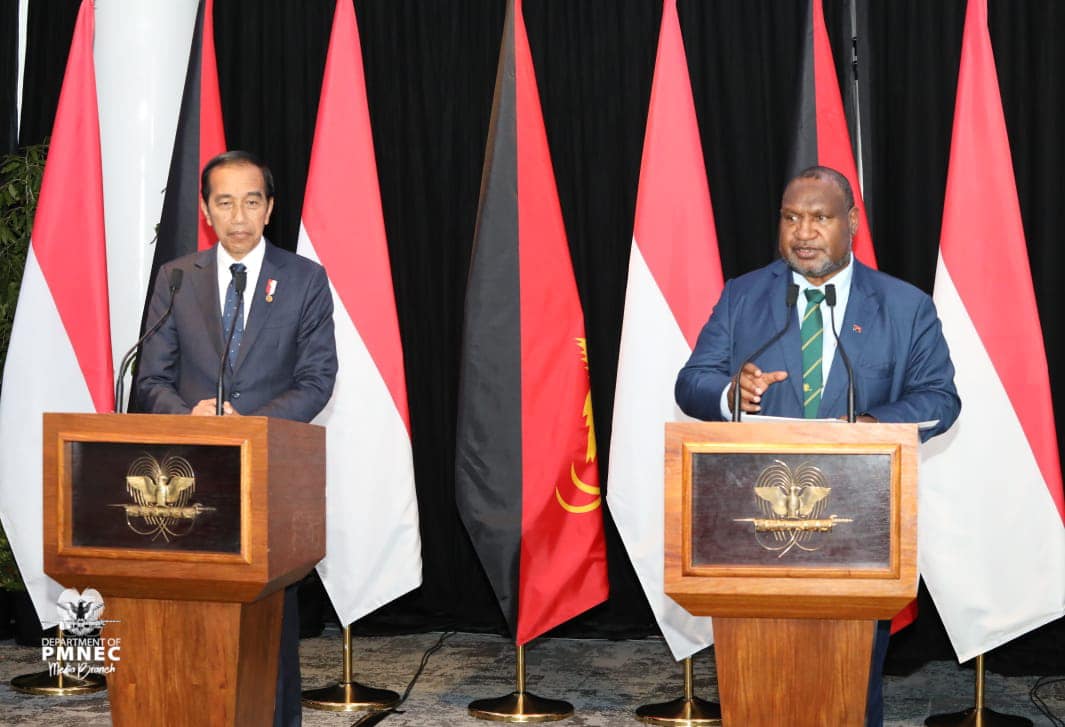Indonesia pledged new aid for Papua New Guinea during a visit by President Joko Widodo to the Pacific island nation and promised to boost border trade that has been stifled for decades by Indonesia’s conflict with independence fighters in its Papuan provinces.
Papua New Guinea’s Prime Minister James Marape on Wednesday said Indonesia would contribute 55 million kina (US$15 million) to upgrading a Port Moresby hospital, including its chronically overcrowded mortuary. Indonesia would also provide 2,000 scholarships for study at its colleges and universities.
BenarNews’ accreditation to attend events for Widodo’s state visit was revoked by Papua New Guinea’s Department of Information and Communications Technology a day before Widodo arrived. No reason was given.
It occurred after BenarNews reported that officers from the National Intelligence Organisation had suppressed a display of the West Papua independence flag ahead of Widodo’s visit. A peaceful Papuan independence movement and armed insurgency has simmered in the Indonesian-ruled western half of New Guinea island since Jakarta took control of the region in the 1960s.
“I will continue to push for discussion on the Indonesia and PNG potential trade agreement so that our economic cooperation can continue to grow,” Widodo told the inaugural PNG-Indonesia Business Forum in Port Moresby.
Papua New Guinea in March, after a decade’s delay, ratified an agreement governing its 760-kilometer (472-mile) border with Indonesia, possibly opening the way to improving relations.
The border that cuts across mountains, swamps and dense jungle is a straight line through the middle of New Guinea except for a squiggly bulge that tracks a river. The line on the map is a product of the colonial era, which split the rule of the Melanesian island and arbitrarily divided indigenous peoples organized around extended kinship.
Trade between Indonesia and Papua New Guinea has been minimal for decades and defence cooperation has languished, in large part because of the conflict between Indonesia and independence fighters in its Papuan provinces.
“This relationship is logically and practically important to both our countries because of our proximity to one another,” Marape said at the business forum. “We share common land borders and we share common ancestry with our Melanesian brothers and sisters in the Papuan provinces.”
The independence movement has grassroots support in Papua New Guinea, which is also home to thousands of refugees from the conflict. The country’s government says it recognises Indonesia’s sovereignty over the Papuan territory, which is often referred to as West Papua.
Neither side publicly mentioned the conflict during Widodo’s visit.
The long-term silence of Papua New Guinea’s leaders on human rights abuses and denied sovereignty stems from the threat posed by Indonesia’s military, said Cammi Webb-Gannon, West Papua Project coordinator at the University of Wollongong.
“The PNG defense force, for example, numbers around 2,000 personnel. Indonesia’s has approximately 436,000,” she told BenarNews. “It is this reluctance to provoke Indonesia’s military, largely a law unto itself, that likely leads to PNG leaders’ reticence.”
In recent years, Indonesia has contributed aid and technical assistance to Melanesian nations in the Pacific including Papua New Guinea and the Solomon Islands in an attempt to counter criticism over lack of development and militarization of its Papuan provinces.
Home to some 270 million people, Indonesia is a rising Southeast Asian power that reaches into the South Pacific region and says it is on track to be the world’s fourth-largest economy by 2045. Its economy and population dwarfs Papua New Guinea’s.
Papua New Guinea’s Minister of International Trade Richard Maru said annual trade between Indonesia and Papua New Guinea was about US$200 million a year, a small amount when compared to their trade with other countries.
“We are the closest of neighbors and we haven’t been able to build a trade and investment relationship over the last 48 years [since Papua New Guinea gained independence],” Maru told the business forum. “It is the time to talk about a new future.”
Ahead of Widodo’s visit, Indonesia’s national airline Garuda, through its Citilink subsidiary, on Sunday began twice-a-week flights between Port Moresby and Denpasar, Bali for the first time.
Widodo, who has made improving Indonesia’s infrastructure a mainstay policy of his presidency, said Indonesia wants to help Papua New Guinea’s efforts to build more roads. Much of mountainous Papua New Guinea is accessible only by light plane.
Papuans on the Indonesian side of the border have at times fled into Papua New Guinea to escape the conflict between the rebels and Indonesia.
Poorly armed Papuan fighters – collectively known as the West Papua National Liberation Army – have battled Indonesia since the early 1960s, when it took control of the remote mountainous region from the Dutch.
Papuans, culturally and ethnically distinct from the rest of Indonesia, say they were denied the right to decide their own future. Indonesian control was formalized in 1969 with a U.N.-backed referendum in which little more than 1,000 Papuans were allowed to vote.
Documented and alleged killings and abuses by Indonesian military and police, from the 1960s until the present day – along with impunity and the exploitation of the region’s natural resources and widespread poverty – have fueled resentment of Indonesian rule.
Widodo said the economic potential of the border between Papua New Guinea and Indonesia is large.
“We need to make border points a new center of economic activity,” he said. “This will be clearly impactful, not only for border communities but for the economies of both countries.”
SOURCE: BENAR NEWS/PACNEWS














